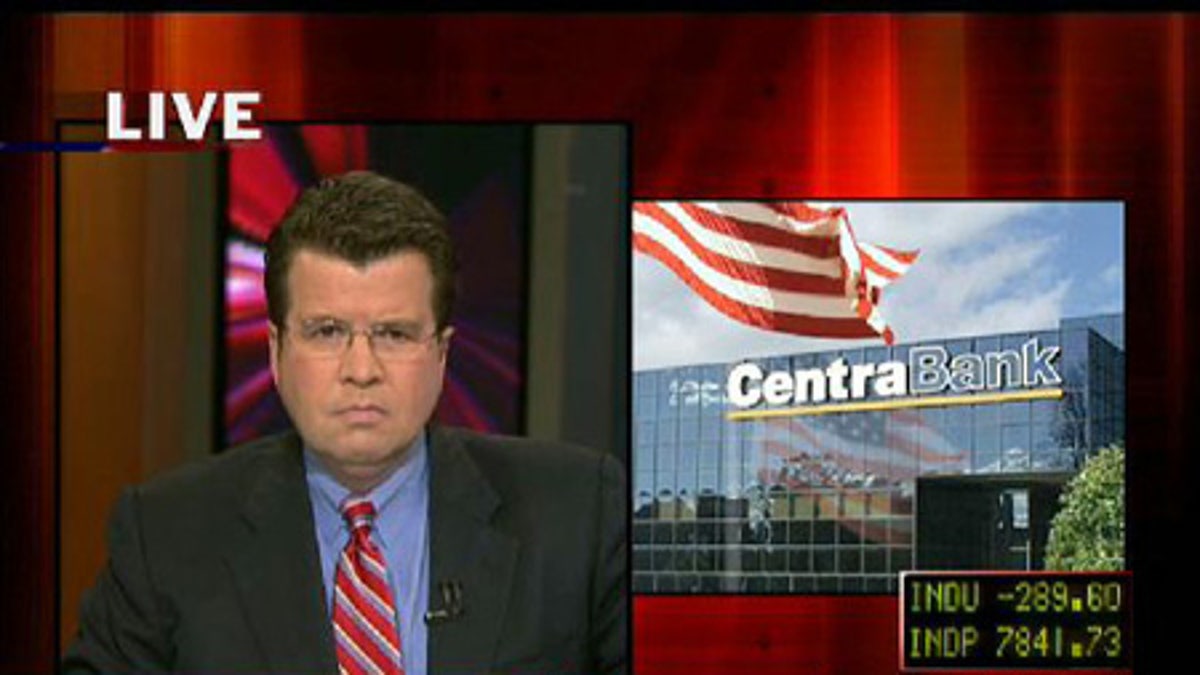
(FNC)
This is a rush transcript from "Your World With Neil Cavuto," April 20, 2009. This copy may not be in its final form and may be updated.
NEIL CAVUTO, HOST: Meanwhile, stressed out, and now, well, just stressed.
The bank CEO was so sick of all the strings attached to the federal rescue dough that this guy decided that he wanted to be free and clear of that dough. And now he is, after paying back more than $15 million.
Joining me on the phone, Central Bank of West Virginia founder and CEO Douglas Leech.
Mr. Leech, pun intended, but you did not want to be seen leeching off of Uncle Sam. Why not?
DOUGLAS LEECH, FOUNDER & CEO, CENTRA BANK: Yes, that's right. We are not freeloaders. We make our own way here in West Virginia.
Really, I should be spending my time right now making loans and garnering deposits, not dealing with government regulations and programs. And that is really the number-one reason why we exited the program.
You need to know that Centra is one of the strongest banks in the country. Its capital levels are nearly double the thresholds of a well-capitalized institution, the highest category achievement a bank can see.
CAVUTO: So, why did you take the money in the first place?
LEECH: We took the money in a spirit of good faith and as a matter of duty.
You need to know that Centra made nearly $475 million — that's nearly half-a-billion dollars — of loans in 2008. Lending was strong here. We're the number-one lender in each of the four markets that we operate in.
But there was no shortage of capital. What we did it for was, as I said, in the spirit of cooperation to actually increase further the lending that we have got.
CAVUTO: Yes.
But, nevertheless, you paid it back very, very early, in fact, a lot earlier than even the government wanted you to. And it comes on the same day some big banks, led by Bank of America, have indicated their lending has actually gone down.
Now, you said there's a reason for that, that, actually, it is prohibitive for banks who get this money to lend it back, right, because the cost of keeping the federal money is not zero percent at all, is it?
LEECH: Well, there were a number of prohibitions.
One, a stated intent of the program under the Bush administration was that it could and should be used for acquisitions of healthy institutions. That is a major part of our strategy in growing the bank. The restrictions that were coming to us by way of prohibitions against foreclosures that certainly would not be in the interest of our shareholders.
The modifications to loan doctors, that is like a mother and father coming into the bank, depositing $20,000 in a C.D., and we make a loan to their daughter or son. The government could come in and tell us to drop that loan rate for whatever reason they choose. But I don't get the opportunity to correspondingly drop the deposit rate. You can see what could happen to our interest margins that way.
CAVUTO: All right, well, if you're right, real quickly, Mr. Leech, it means that all this money we have been giving the banks, thinking that they will be more encouraged to lend, it sounds to me like quite the opposite could happen, right?
LEECH: Well, the effect of this has been, on March 31, we returned the $15 million.
In a separate transaction, a week later, we sent back the $750. That is $1 per share for the preferred class B warrants. Two days later, Treasury sent that money back to us by way of a wire with a letter to me saying that the path through clearing these TARP restrictions is to pay the $750,000.
CAVUTO: All right.
LEECH: In reality, it was a penalty, a penalty for early withdrawal from the program. And Centra has been impacted by the — the tune of about $750,000.
For us, that amounts to 32 small business loans, totally $7.5 million, as we leverage our capital at a ratio of 10.
CAVUTO: OK. All right. You were actually choking me up there.
Mr. Leech, thank you very, very much.
LEECH: Thank you for having me.
CAVUTO: All right.
Content and Programming Copyright 2009 FOX News Network, LLC. ALL RIGHTS RESERVED. Transcription Copyright 2009 CQ Transcriptions, LLC, which takes sole responsibility for the accuracy of the transcription. ALL RIGHTS RESERVED. No license is granted to the user of this material except for the user's personal or internal use and, in such case, only one copy may be printed, nor shall user use any material for commercial purposes or in any fashion that may infringe upon FOX News Network, LLC'S and CQ Transcriptions, LLC's copyrights or other proprietary rights or interests in the material. This is not a legal transcript for purposes of litigation.
